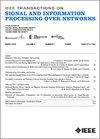周期通信的频域扩散偏置补偿自适应
IF 3
3区 计算机科学
Q2 ENGINEERING, ELECTRICAL & ELECTRONIC
IEEE Transactions on Signal and Information Processing over Networks
Pub Date : 2023-09-12
DOI:10.1109/TSIPN.2023.3313810
引用次数: 0
摘要
当每个节点的输入信号受到噪声干扰时,分布式频域自适应算法产生有偏估计。为了在降低通信负载的情况下消除噪声引起的偏置,本文提出了周期通信的频域扩散偏置补偿自适应滤波。通过最小化偏置消除成本函数,首先推导了频域扩散偏置补偿LMS(FD-BCLMS)。随后,为了降低计算复杂度和通信成本,我们采用周期更新和通信策略设计了双周期FD-BCLMS算法。此外,还开发了具有功率归一化方案的DPFD-BCLMS(DPFD-BCNLMS),以提高有色输入情况下的收敛速度。研究了瞬态和稳态行为。对于DPFD-BCNLMS中的稳态性能退化,我们在接近稳态的情况下修改了组合步骤,从而产生了切换DPFD-BCNLMS(SDPFD-BCNLMS)。还提供了一种新的输入噪声方差估计方法。最后,通过数值模拟验证了所提算法的优越性。本文章由计算机程序翻译,如有差异,请以英文原文为准。
Frequency-Domain Diffusion Bias-Compensated Adaptation With Periodic Communication
When the input signal of each node is interfered by noise, the distributed frequency-domain adaptive algorithm yields biased estimation. To eliminate the noise-induced bias with reduced communication load, this article proposes the frequency-domain diffusion bias-compensated adaptive filtering with periodic communication. By minimizing the bias-eliminating cost function, the frequency-domain diffusion bias-compensated LMS (FD-BCLMS) is first derived. Subsequently, to achieve lower computational complexity and communication cost, we design the double periodic FD-BCLMS (DPFD-BCLMS) algorithm by resorting to periodic update and communication strategies. Moreover, the DPFD-BCLMS with power normalized scheme (DPFD-BCNLMS) is developed to improve the convergence rate in the case of colored input. The transient and steady-state behaviors are investigated. For the steady-state performance degradation in the DPFD-BCNLMS, we modify the combination step near steady-state, resulting in the switched DPFD-BCNLMS (SDPFD-BCNLMS). A new estimation method for the input noise variance is also provided. Finally, the superiority of the proposed algorithms is validated by numerical simulations.
求助全文
通过发布文献求助,成功后即可免费获取论文全文。
去求助
来源期刊

IEEE Transactions on Signal and Information Processing over Networks
Computer Science-Computer Networks and Communications
CiteScore
5.80
自引率
12.50%
发文量
56
期刊介绍:
The IEEE Transactions on Signal and Information Processing over Networks publishes high-quality papers that extend the classical notions of processing of signals defined over vector spaces (e.g. time and space) to processing of signals and information (data) defined over networks, potentially dynamically varying. In signal processing over networks, the topology of the network may define structural relationships in the data, or may constrain processing of the data. Topics include distributed algorithms for filtering, detection, estimation, adaptation and learning, model selection, data fusion, and diffusion or evolution of information over such networks, and applications of distributed signal processing.
 求助内容:
求助内容: 应助结果提醒方式:
应助结果提醒方式:


